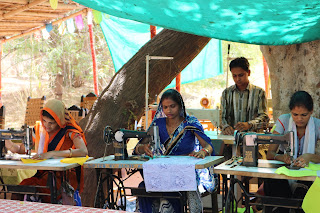March 29, 2018
Today we left the beautiful palace hotel and traveled 5 hours by bus to a village camp. First we made a stop at Dhonk. It’s a women’s co-op that was started by a young woman who wanted to help women develop a sustainable skill. Originally the women were those who had husbands that had been jailed due to poaching and other infractions within Ranthambore Park. As they had not been wage earners, they needed help to support their families. Today, it is open to women and men who want to learn a wage earning skill. Dhonk also helps support the tiger conservation efforts by sharing the profits form the products sold.
Today we left the beautiful palace hotel and traveled 5 hours by bus to a village camp. First we made a stop at Dhonk. It’s a women’s co-op that was started by a young woman who wanted to help women develop a sustainable skill. Originally the women were those who had husbands that had been jailed due to poaching and other infractions within Ranthambore Park. As they had not been wage earners, they needed help to support their families. Today, it is open to women and men who want to learn a wage earning skill. Dhonk also helps support the tiger conservation efforts by sharing the profits form the products sold.
This lady was making bread for our lunch.
A local tradition is to paint designs on the ground/ floor in celebration of festival times.
Women working on their craft items.
The program started with 2 donated sewing machines in the founder’s garage. Today they have a fairly nice work space where they can also display their items for sale. As you can see men also work at the center.
They do the block printing of fabrics.
This wonderful lady had lunch with me. Her husband works in Delhi and only gets to come home once a month. She has 4 boys with the oldest in college. Her hopes are to have all her children get an education as she is illiterate.
She makes small stuffed tigers. Of course I bought one.
After our lunch we took our 5 hour bus ride to a small village camp. As we arrived we were greeted with drum playing and received a lei which is tradition here in most places.
Our group received some lemonade as we listened about the camp.
It was a beautiful and very peaceful setting.
The tents were large and very comfortable.
There was a reception before we were invited into the kitchen for a cooking lesson.
K.D. ( our tour leader) explained the different spices used in Indian cooking.
After the chef demonstrated the proper technique, I tried my hand at making phulka bread. It’s a wheat flat bread. First you roll a small ball of dough out into a circle.
Then you brush some oil onto half of the circle, fold it in half, brush oil on half again and fold one more time.
Then you roll it to try and seal the edges.
You place it on a hot tawa pan (like a small cast iron griddle) and brown on both sides turning it a few times.
It turned out pretty good. I will try this once I get home.
After our cooking class we were entertained by a group of local farmers who came to sing some traditional songs and show us some dance moves.
One of the men showed us how they wrapped the long piece of cloth to make the traditional men’s pants called a dhoti. It seemed a bit complicated to me.
There was an owl living in the tree just outside my tent.
I talked with the family that was next to the camp about their cows and water buffaloes. They milk them both for use.
After our breakfast the next morning we headed to Agra where the Taj Mahal is located. I am excited about the opportunity to see the world known landmark.



































No comments:
Post a Comment